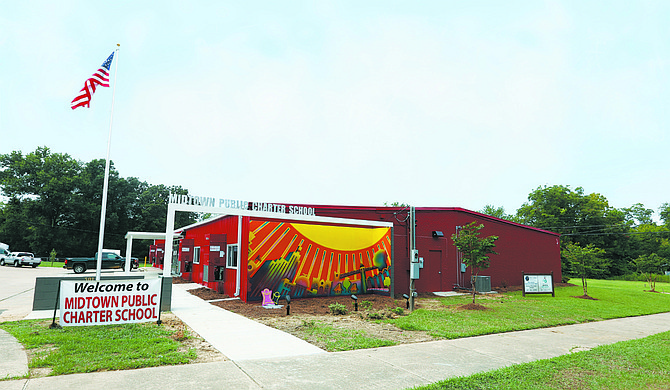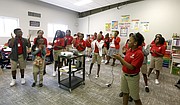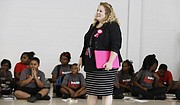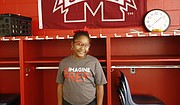Photo by Imani Khayyam.
"On the count of three, we are going to stand. Y'all move your desks that way, and y'all move your desks that way, and then we are going to do the Cha-Cha Slide, and we might do the Cupid Shuffle. I might give y'all two."
The sixth graders quiet down and stuff their binders under their desks. It's clear that dance breaks are an expected part of their school day when Mrs. Underwood is teaching.
She cues up a YouTube video with the Cha-Cha Slide as students spread out, and then begin to dance: slide to the left, slide to the right, cha-cha real smooth. Mrs. Underwood stays in the middle of the room, dancing along with the class.
The students giggle as they go, but for the most part, the sea of red polo shirts and khaki bottoms stay in unison, sliding across the brand new carpet in the Midtown Public Charter School classroom.
Engaged at Midtown Public
Chasity Underwood was born to teach. Sit in her classroom for 10 minutes, and it's obvious that she has honed her skill at keeping a class's attention and teaching them a thing or two in the process.
Standing at the middle of the classroom, facing the same whiteboard as the students, Underwood navigates a slideshow on decimal placement from her MacBook. The boys and girls respond to her questions, with at least five raised hands at her call for an answer. The respect is palpable—there are no whispers from the back of the classroom, and 27 sixth graders are engaged and learning about the value of decimal placements.
Underwood, 34, taught in Jackson Public Schools for 10 years. She was a science teacher at Siwell Middle School, then a biology teacher at Murrah High School. She was involved with her students in and beyond the classroom, attending her students' football and basketball games.
The Jackson native graduated from Jackson State University with an undergraduate degree first in biology and pre-med. She started nursing school but didn't finish—once she started working as a substitute teacher, she realized teaching was what she really enjoyed. She got her master's degree in elementary education at JSU and her teaching credential. Her dedication to public education is obvious. "Fully Fund MAEP" bumper stickers adorn her car, alongside Murrah High School and JSU pride decals.
This year, however, Underwood left Murrah to teach at Midtown Public Charter School—she had no regrets about teaching at JPS, however, and expressed her gratitude for getting her start in the district. Underwood said she would miss Murrah, but she believed she could make a difference teaching in Midtown, and she needed a new challenge. Midtown Public has proved challenging so far: building a school and a curriculum has kept Underwood on her toes.
"It was time to shake it up and stretch my brain," she says. "It's going to require me to study a lot harder, doing a lot of extra homework making sure I am on top of my game so I can present it to my students."
Underwood teaches the STEM—science, technology, engineering, math—component of her sixth-grade classroom, appropriately called the Jackson State Cohort. Her partner teacher and fellow JSU grad, Janet Wallace, teaches the humanities portion. There is a separate coding teacher who teaches all the students. The Jackson State cohort of students is entirely African American save one white student.
Underwood's experience shows; her teaching style is polished. She calls on students not raising their hands, engaging those at the back and corners of the classroom. After almost an hour of decimals, the most patient students are antsy, and Mrs. Underwood knows it and calls a dance break.
School days are long at Midtown Public—7:30 a.m. to 4:30 p.m. Since the school days are longer than what the 107 students enrolled there are used to coming from public school, they have had to adjust to more time in the classroom.
"I give them two to three dance breaks a day," Underwood says.
True North: College Prep
Midtown Public Charter School is a relatively small, red building on Adelle Street that opened this year—a couple weeks after the school year officially started so that construction could be completed on the new building. The charter school held its first classes in Jackson State University classrooms, a welcome and at-home place for Underwood.
Underwood and Wallace's classroom is called Jackson State; there are also Yale, University of Georgia and University of Tennessee "cohorts" in the school. Students are called scholars at Midtown Public, and the focus is on college—even though the school only teaches fifth and sixth grades for now. The school will grow to serve fifth through eighth grades, eventually serving 208 students at its capacity in two years.
Adam Mangana, the head of school at Midtown Public, said the true north for his school is college prep, and this focus is critical for fifth and sixth graders because it helps them look beyond high-school graduation to a "lifelong appreciation for learning."
"That's what we want to see from the charter movement in Mississippi," Mangana said. "It's an investment in human capital in Mississippi."
Foam fingers and posters adorn the walls, and college-prep is important in most charter-school settings.
Mangana, 33, said that national statistics put middle schoolers at risk of not graduating from high school.
In 2013, 66 percent of fourth graders in the U.S. were not reading on grade level, according to the National Assessment of Education Progress.
"The middle-school years are the years in which we see a downward trajectory if they do not see intervention, and we see this especially in Mississippi," Mangana said.
Mangana was in the Teach for America corps and then taught in private schools, most recently he taught social studies and served as dean of students for the middle school at St. Andrew's Episcopal School. By starting Midtown Public Charter School with the fifth grade, Mangana hopes to intervene and help students who aren't reading on grade level get to grade-level reading or higher before high school.
"If children aren't reading on grade level (in middle school), they likely won't complete high school," he said.
Mangana said his school uses intervention periods and small group instruction to bring students up to speed. Students entered Midtown Public Charter reading at a range of levels, he said. Longer school days, two teachers for about 26 students (compared to a single teacher in most public-school classrooms with the same number of students) and coding classes are also a part of the overall strategy to intervene and put the students on a success path. Mangana has attracted students from 40 different middle and elementary schools throughout JPS and Jackson.
Reimagining Public Education
Mississippi has only two charter schools so far—and both are in Jackson. Across town in south Jackson, Reimagine Prep opened its doors this fall, too.
It's 7:20 a.m. on a Monday morning, and students are still being dropped off at Reimagine Prep, and they are right on time for community circle. Some students get out of their parents' cars, shake two administrators' hands and file into the multi-purpose room for breakfast. Other students have already started completing the weekly worksheet that they will fill out before they even get to class.
Students are expected to read when they are finished with their worksheet, but once the large group discussion begins, all eyes are on whoever is speaking. Christina McDonald, the principal, calls the school to order.
"Good Morning, Reimagine Prep," McDonald says, addressing the room of 120 fifth-grade students.
"Good Morning, Miss McDonald!" the room replies.
The principal begins to build some excitement for the day before jumping into the worksheet. She already knows most students' names even though it's only the third week of school. As a way to keep students engaged, and because of McDonald's music background, call-and-response chants wake everyone up.
"We are a team and a ... ?"
"FAMILY!" the room screams.
"Thank you for tracking me, I feel really respected, as a team and a ... ?"
"FAMILY!" the students shout back.
"I want to see which homeroom knows our chant the best. Capiche?"
"Capiche!"
"Scholars, your goal is to not let your teachers be more zesty than you. Reimagine represent!"
The whole room explodes in a loud chant that is surprisingly in unison for a group of students that has only been together for a few weeks.
McDonald is a Nashville native and was originally a music teacher, and her background shows in her interaction with students. She sings a lot of the instructions as a way to get students into "star" position, when students sit up straight with hands folded in a star in front of them.
"This is how we do it," McDonald sings.
"Get, get, get in star!" students respond, as they fold their hands in front of them.
Once the community breakfast is done, students head slowly to their homerooms as classes are dismissed one at a time. While everyone waits, they read. Teachers actively walk around their students' tables, shushing noisy ones and answering questions of others, encouraging everyone to read while they wait. Students file out of the lunchroom in a single-file line, and the long white-walled hallway fills with lines of students waiting outside their classroom.
Before students can enter class, a teacher will check their uniforms. As soon as they get into their classrooms, students get to work—they write down their goals and things they are thankful for on a daily progress sheet. Principal McDonald wanders through classrooms, interacting with students and teachers. She carries her clipboard that contains a daunting list of all students' names and their demerits and merits.
Students can earn merits or demerits that translate into a daily "paycheck." Every day a student starts with $100, and they earn extra dollars when they do something above and beyond what is expected of them, McDonald said. Students can spend their dollars or points on things like backpacks or pencils, or if they save up their dollars, they can win special trips or outings with teachers.
Reimagine Prep is contained in one long hallway. Posters with quotes like, "No act of kindness no matter how small is ever wasted" (Aesop) cover the white walls on mounted signs in the school's red, white and blue color scheme. Their mascot, a lion, is painted next to the office. These halls used to contain St. Therese's Catholic School, but after that school closed at the end of the 2013-2014 school year, Republic Schools Inc., the Nashville-based charter-management organization that runs Reimagine Prep, picked up the lease and redesigned the school in time for the 2015-2016 school year.
Teachers leave their classroom doors open, mainly because McDonald is very active in the learning and engagement process. She observes the two teachers in each classroom's actions and addresses students by name—seemingly knowing most of them at the end of the school's second week.
McDonald is not new to the charter-school scene—she was a part of the founding team at Nashville Prep, Republic Schools' first charter school. She taught and worked as the assistant principal at the Tennessee school for three years. McDonald, 34, has worked in charter schools since graduating from Belmont University with her bachelor's degree in music education. She taught music at KIPP Infinity, a charter school in New York, before she was recruited to be a part of Republic Schools.
McDonald pulls Chyna Harris, 10, from class because she is a designated school "ambassador"—a student who speaks to guests and visitors when they come to Reimagine Prep. Harris said she likes Reimagine Prep better than her old JPS elementary school so far. "I got bullied a lot at my old school, and I feel so much safer in Reimagine Prep," she says.
Harris, whose favorite subjects are reading and math, says she is learning more here than in her old school. Harris and McDonald have a secret handshake, which ends with both saying, "Got your back." McDonald emphasizes the importance of being a team and family, and Harris has already caught on.
"We really focus on growth—especially at the beginning—making sure we (students and staff) don't have a negative mindset," McDonald says.
McDonald says her goal is that every student will earn "student of the week" by the end of the year. Students earn the recognition when they have the highest "paychecks," or the most merits, for that week. McDonald focuses on celebrating students, especially in front of their peers, pointing out students who are respectful, intuitive or inquisitive.
In just the first month of school, McDonald has already set specific standards and created a culture that is obvious in how teachers interact with their students. The same language—students are called scholars here, too, for example—keeps the narrative cohesive. Students are each a part of a college cohort here, too. There's a Bowling Green, University of Mississippi and Mississippi State and Bowdoin College cohorts. Each cohort is named after one of the teachers' alma maters.
In three years, Reimagine Prep will be a full middle school serving grades 5-8, but for now, there are only fifth graders here.
When Charters Came
Charter schools weren't legal in Mississippi until 2013, when the Legislature passed the Mississippi Charter School Law, allowing nonprofit charter schools to enter the state for the first time. Mississippi's law is fairly strict compared to other states, and some public-school advocates were pleased that the law has a stringent protocol for charters to be accepted.
Charter-school applications run through the Charter School Authorizer Board, separate from the Mississippi Department of Education, although state superintendent Dr. Carey Wright sits on the board. The board sets agreements, called charters, with each nonprofit organization that will run a charter school, under certain criteria set out in the 200-page state law. The charters will typically be set to last for five years and are eligible for renewal when they've expired.
Applicants to manage schools are evaluated on their proposed academic standards and curriculum; financial strategy to sustain themselves; performance and evaluation metrics; organization of the proposed school and staff; and compliance with all points of the charter-school law.
"They are given autonomy in exchange for accountability," Marian Schutte, executive director of the authorizer board, said.
Charter schools are public schools, under Mississippi's law, and they use the same per-pupil Mississippi Adequate Education Program funding that public schools do. If charter schools are looking to enter a school district that has higher than a "D" or "F" grade, that school board must approve them by a majority vote.
Charters do not need permission from failing school districts, however, and Reimagine Prep and Midtown Public Charter School were able to open without the Jackson Public Schools board's permission in Jackson because of the district's "D" grade.
Beneta Burt, president of the JPS board, said that her board has asked the superintendent to prepare a report including how many children have left JPS for charter schools, how its affecting the public schools and what financial impact the new charters are having on the school district. The report will be ready before the board's next meeting on Oct. 6 but was not ready by press time.
Charter schools are required to fill 80 percent of their student population with students who qualify for free or reduced lunch and students who have disabilities in the public-school system—the idea being that the underserved and poorest students can have access to a more advanced education. This percentage can fluctuate since a charter school is required to "meet an underserved student requirement which is 80 percent of the local district’s underserved student percentage" according to Mississippi's Charter Law. So depending on the what school district a charter in will determine the percentage of underserved students.
Not everyone is on board with the charter-school movement coming to Mississippi, however, especially since public education has only been fully funded twice since 1997. They argue that public schools have been set up to fail.
'Private Charter Schools'
Since charter schools receive the same per-pupil funding as the state's public schools, advocates are concerned that the new charters in Jackson are pulling funds from an already-strained school district's budget. Charter schools do not receive public funding for transportation, teacher retirement plans or startup building costs. Reimagine Prep and Midtown Public both run their own buses to pick up their students throughout Jackson.
Joyce Helmick, president of the Mississippi Association of Educators, said charter schools pull funding from public schools that are badly in need of additional funding.
"If you take away from what is already a budget shortfall or underfunding, then that makes a deeper hole so that our students are getting less of what they need," Helmick said.
She said that during her visits to real public schools, especially in JPS, students have expressed their desire to get more computers into their classrooms, and librarians want more books in their libraries to better serve their students. With more funding, these problems might be addressed, Helmick said, but now that these schools are losing students (and the funding that comes with them) to charter schools, things seem less likely to change.
In essence, charter schools reap the benefits of public-school funding without the same accountability, and some critics refuse to call them "public schools" at all.
Helmick calls them "private charter schools."
"They're private charter schools because the public schools are accountable to the voters, and the private charter schools are not accountable to the voters," she said.
Charter schools in the state are accountable to the Mississippi Charter Law and to their nonprofit organization (via its board of directors) as well as to the Mississippi Charter School Authorizer Board.
Public schools, on the other hand, are accountable to voters through the state auditor's reports, the Mississippi Department of Education and their districts' school boards. Public schools are required to disclose their financial information and open their meetings to the public. Charter schools might disclose this information, but they are not required to disclose them to the Department of Education. Instead they report all information to the Mississippi Charter Authorization Board, and Schutte said the audits from charter schools are open records.
Midtown Public Charter School has made its board meetings open to the public and encourages parents to attend. Republic Schools Inc. also has public board meetings every other month.
Since charter schools in Mississippi must fill 80 percent of their student population with students who qualify for free or reduced lunch, charter schools must target students in poor communities, but it cannot include them all.
Oleta Fitzgerald, the director at the Children's Defense Fund's southern regional office, said charter schools are not going to impact the large number of children that the state needs to reach in order to increase opportunity for children in Mississippi. Fitzgerald said her organization will continue to focus on the children in underfunded public schools that lack resources in their classrooms.
Mississippi's charter law mandates that charter schools cannot be governed or operated by for-profit companies, but public-school and youth advocates have long critiqued the business of charter schools in both nonprofit and for-profit settings, which have seen mixed outcomes.
"When the legislation was being proposed, we thought that the charter bill should have covered all school (districts), but one of the reasons we think it didn't happen and one of the reasons you don't have a great influx of charters here is that there's no money in it," Fitzgerald said.
Charters in Mississippi are governed by nonprofit organizations, and Mississippi's charter law has made it more difficult to monetize charter schools as a business here since for-profits are boxed out. In other parts of the country without a stringent law, the privatization of education has run rampant, like in New Orleans where the majority of schools in the system have been "charterized." Fitzgerald said for-profit charter organizations target high-performing school districts so that they can draw from the high taxpayer base that exists in more affluent communities.
Fitzgerald doesn't think the charter schools in Mississippi are opening for financial gain, but she maintains that charters can be just one tool in the toolbox for education in the state.
She said with the poverty levels and low access to early education in the state, a lot of work has to be done outside the charter-school movement.
"The early childhood access we currently have reaches only half of the student population; only 20,000 (students) are in early childcare. Unless we start there, the rest of this stuff is just sticking our head in the sand," she said.
'A Great Place to Start'
Both Reimagine Prep and Midtown Public Charter School were required to open applications to all JPS students—anyone could apply, and a lottery or wait list would only occur if application numbers exceeded available spots. Both schools were able to fill their available spots at the start of the school year.
However, both schools now have wait lists for next school year. Students who are already enrolled at the charters will not have to reapply.
If students are applying to a grade that already has a full class, however, they are on a wait list in case a student leaves the school.
A key difference between charter schools and public schools is governance. Besides not being subject to state standards, charter schools are not required to use set curriculum standards outlined by the state or federal government. They are only subject to state testing requirements, which their students will participate in with the rest of public-school students.
Preparing third- through eighth-grade students for state testing must be a priority for new schools in order to remain open.
The idea behind the autonomy of charter schools is that less governance from a school district or a state department might lead to more learning, and more attention to low-performing students can help students improve skills and scores simultaneously. Indeed, Republic Schools Inc., which opened its first four schools in Nashville, Tenn., boasts good numbers in terms of learning outcomes for students. Two Nashville-based Republic middle schools ranked in the top 5 percent of schools in Tennessee for growth and performance—both held the top two spots for seventh-grade math achievement of public schools in the state in 2014.
Since charter schools have the freedom to be innovative with their curriculum, many include a focus on STEM education and technology courses. Coding is a part of the curriculum at Midtown Public School and Reimagine Prep—students will learn how to read and write coding languages like CSS or HTML, a valuable skill for students to design and develop websites in the future.
The high academic standards come with some stricter policies than Jackson Public Schools students were likely used to. Both charters have longer school days than their public counterparts.
Ravi Gupta, CEO of Republic Schools, splits his time between Jackson and Nashville. The Yale Law School graduate said current research shows that after fourth grade, students stagnate or plateau in reading levels and literacy growth.
"Fifth grade will be a great place to start to stop students from descending," Gupta said.
All Shapes and Sizes
Charter schools come in all shapes and sizes across the nation, including those run for profit. Because of Mississippi's stringent law, however, only nonprofit charter schools are allowed to access public-school funding. Besides MAEP funding, charter schools in the state are allowed to raise their own funds through donations or big donors in order to help pay for their facilities or transportation.
Midtown Public Charter School is what Mangana called a stand-alone charter school. Stand-alone charter schools are different from charter schools started by charter management organizations and not necessarily as focused on growth or expansion. Midtown will grow its school to eighth grade and not expand. The building was built to hold a set number of students, and Midtown Partners chose to propose a middle school based on what Midtown residents wanted to see, according to Kristi Hendrix, the executive director of Midtown Partners.
Midtown Partners is the founding nonprofit organization behind Midtown Public Charter School, and its board oversees the school, technically, although the nonprofit elected a separate board of trustees to oversee the charter school. That board is made up of 14 members that make all of the governing decisions for the school. In its application, Midtown Partners proved its financial support as an entirely nonprofit organization, because they have also started a Montessori center in Midtown.
The Midtown Education Council travelled for a year looking for charter-school models to emulate, and they landed on Edward Brooke Charter School in Boston. Midtown Public uses curriculum and daily schedules that emulate those at Brooke. A large part of Midtown Public's application success was demonstrating how the school would put the model to use, Hendrix said. Another key focus of the Brooke model is that it is "warm-strict" in nature, with a focus on creating a nurturing environment despite the demanding school day.
Republic Schools is a charter management organization, a nonprofit that oversees and runs multiple schools in Tennessee and now Mississippi. CMOs commonly have the same curriculum, standards and practices in all their schools. Reimagine Prep is Republic's fifth school.
Republic Schools Inc. has its own board of directors, with members from Tennessee and Mississippi, and currently they are the direct governing body of Reimagine Prep. Republic Schools Inc. has no plans to grow to other states, yet, Gupta said, but as long as their relationship with community members (and likely political leaders too, like Gov. Phil Bryant and Lieut. Gov. Tate Reeves who attended the school's grand opening) in Jackson stays strong, the CMO looks to open more schools here.
"We only expand if we have the leadership to start new schools and the resources," Gupta said.
Republic Schools Inc. was recently approved to open two more charter schools in Jackson: Smilow Prep and Smilow Collegiate, named after the former CEO of Playtex Products and philanthropist Joel E. Smilow. Smilow, an 81-year-old retired, white Connecticut native, donated $1 million to start the two new schools. Smilow is also known for his contributions to Republican presidential campaigns, most notably former Mass. Gov. Mitt Romney and Arizona Sen. John McCain.
Smilow Collegiate will serve grades kindergarten through eighth, and Smilow Prep will serve grades five through eight. The schools will grow by a grade level each year until the classes reach eighth grade. The two charter schools will be on the same campus at Northside Drive on the old campus of Wesley Biblical Seminary the site of the former Broadmoor Baptist Church before it moved to the suburbs. By 2023, the schools could have a combined enrollment of 1,600 students.
A family foundation led by descendants of the late lumberman, bank investor and civic leader Warren Hood has agreed to buy the sprawling campus, renovate it and lease it to Republic. The K-8 school plans to enroll 198 students in kindergarten and first grade next August. The middle school plans to enroll 199 fifth graders. Each school would add one grade a year, with the middle school reaching 458 students by 2019 and the K-8 school reaching 942 students by 2023. Combined with Reimagine Prep, the new schools would give Republic more than 1,800 students, larger than many of Mississippi's traditional public-school districts.
So far, all the approved charter schools have been in Jackson. The Mississippi Charter Authorizer Board has been holding meetings in other parts of the state to try to build interest but has turned down applications from Columbus and Natchez, calling them insufficiently prepared.
Celebrating the Small Things
At the end of Fridays at Reimagine Prep, all students who did not drop below the $70 merit mark get to participate in the Friday Celebration in the gym. Unlike normal pep rallies, students sit cross-legged on the gym floor in a square formation—each homeroom makes up one side of the square. The celebration involves a lot of chanting, cheer competitions (which are really a "which-cohort-is-the-loudest" contests) and student awards for the week, as some parents sit in folding chairs in a corner of the gym. The students are in casual dress uniforms at this Friday celebration, with T-shirts tucked into tailored shorts.
Only time will tell how effective the radically different environments will be for students in Mississippi, or if the intervention in middle school is the solution for graduating students from high school and getting them into college. The state cannot know yet the full effect on existing public schools as they lose funding that many argue could help them get back on track.
Update: This story has been updated to reflect a nuance in the Mississippi Charter School Law about the "80 Percent Rule" that says, "A charter school isn’t required to fill 80% of its seats with free lunch or students with disabilities but meet an underserved student requirement which is 80% of the local district’s underserved student percentage." Additionally, a previous version of this story said that "Charter schools might disclose this(financial) information, but they are not required to." To clarify, charter schools are not required to report to the Department of Education but instead they report all information to the Mississippi Charter Authorization Board, and those audits from charter schools are open records.
The Mississippi Charters: Reimagine Prep vs. Midtown Public Charter
Similarities:
Long school days
Run their own buses
Grades served: 5-8
College-Prep Focus and Language
Reimagine Prep:
Charter Management Organization
Republic Schools Curriculum and Model
Style: Open Doors; Collaboration Across Other Republic Schools
Midtown Public Charter:
Stand-Alone School
Curriculum based on Brooke Charter Schools Model
Style: Warm-Strict; Two Teachers per Classroom
See more stories at jfp.ms/charter.








Comments
Use the comment form below to begin a discussion about this content.